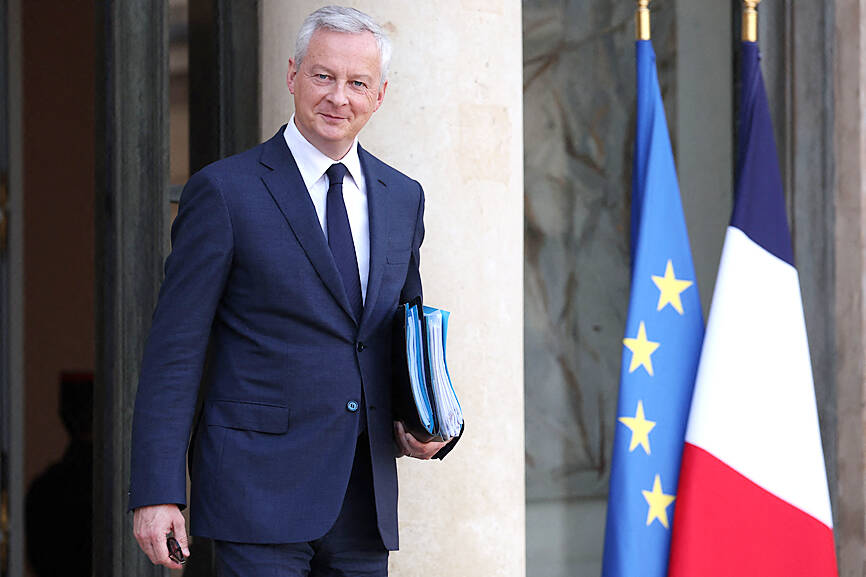French Minister of Finance Bruno Le Maire stepped up demands for the EU to take swift and firm action in response to the climate provisions contained in US President Joe Biden’s new spending initiative.
France is concerned that several provisions in the US Inflation Reduction Act discourage investment in the EU and discriminate against European companies, particularly tax credits for US-made electric vehicles (EVs).
Le Maire said “firm and proportionate” options could include stricter environmental rules, measures to ensure preference for European production, or an acceleration of reciprocity rules. Asked if Europe could lodge a complaint with the WTO, he said the continent should use all options available.

Photo: AFP
“We must react fast. I’m calling for a united, strong and coordinated response from the EU to our American allies,” Le Maire said in an interview with Les Echos. “Only a hard line will allow us to get results.”
The US and the European Commission created a task force last month to try to resolve their disagreements, European Commissioner for Internal Market Thierry Breton said on BFM Business radio.
The EU has presented a letter to that forum with specific points that it believes contravene WTO rules.
“Either they will be resolved there — and we hope they will, that’s why we have the task force, to discuss this — or we will have to go to the WTO and envisage retaliatory measures,” Breton said.
Le Maire said he is struggling in negotiations for investment from a foreign company in the EV sector as the US is ready to offer four times the amount of subsidies.
In total, France estimates that about 10 billion euros (US$9.98 billion) of investment and 10,000 jobs are at stake.
“There is a risk of a major shock for French and European industry,” Le Maire said.
Japan joined the EU in calling planned US aid for local EV manufacturers “discriminatory,” and demanded equal treatment for the nation’s automakers.
The country’s auto industry might hesitate to invest in the electrification of vehicles in the world’s largest economy if the US offers “discriminatory incentives” to local manufacturers, Japan’s government said in a statement on Friday.
“This could cause negative impacts on the expansion of investment and employment in the US,” it said.
A multinational dispute has been raging over the recently passed US Inflation Reduction Act and subsidies to be provided through it to support green technologies in the country. The EU, South Korea and other trading partners see the aid as unfair.
The US should give Japan “treatment no less favorable” than North American countries regarding requirements concerning the final assembly of vehicles, critical minerals used for their manufacture and their battery components, the statement said.
The requirements of the EV tax credit are “not consistent” with the US and Japan’s shared policy to work with allies and like-minded partners to build supply chains, the Japanese government said, adding that the provisions “preclude Japanese businesses from enjoying the benefit.”

Nvidia Corp chief executive officer Jensen Huang (黃仁勳) on Monday introduced the company’s latest supercomputer platform, featuring six new chips made by Taiwan Semiconductor Manufacturing Co (TSMC, 台積電), saying that it is now “in full production.” “If Vera Rubin is going to be in time for this year, it must be in production by now, and so, today I can tell you that Vera Rubin is in full production,” Huang said during his keynote speech at CES in Las Vegas. The rollout of six concurrent chips for Vera Rubin — the company’s next-generation artificial intelligence (AI) computing platform — marks a strategic

REVENUE PERFORMANCE: Cloud and network products, and electronic components saw strong increases, while smart consumer electronics and computing products fell Hon Hai Precision Industry Co (鴻海精密) yesterday posted 26.51 percent quarterly growth in revenue for last quarter to NT$2.6 trillion (US$82.44 billion), the strongest on record for the period and above expectations, but the company forecast a slight revenue dip this quarter due to seasonal factors. On an annual basis, revenue last quarter grew 22.07 percent, the company said. Analysts on average estimated about NT$2.4 trillion increase. Hon Hai, which assembles servers for Nvidia Corp and iPhones for Apple Inc, is expanding its capacity in the US, adding artificial intelligence (AI) server production in Wisconsin and Texas, where it operates established campuses. This

SEMICONDUCTORS: The German laser and plasma generator company will expand its local services as its specialized offerings support Taiwan’s semiconductor industries Trumpf SE + Co KG, a global leader in supplying laser technology and plasma generators used in chip production, is expanding its investments in Taiwan in an effort to deeply integrate into the global semiconductor supply chain in the pursuit of growth. The company, headquartered in Ditzingen, Germany, has invested significantly in a newly inaugurated regional technical center for plasma generators in Taoyuan, its latest expansion in Taiwan after being engaged in various industries for more than 25 years. The center, the first of its kind Trumpf built outside Germany, aims to serve customers from Taiwan, Japan, Southeast Asia and South Korea,

Garment maker Makalot Industrial Co (聚陽) yesterday reported lower-than-expected fourth-quarter revenue of NT$7.93 billion (US$251.44 million), down 9.48 percent from NT$8.76 billion a year earlier. On a quarterly basis, revenue fell 10.83 percent from NT$8.89 billion, company data showed. The figure was also lower than market expectations of NT$8.05 billion, according to data compiled by Yuanta Securities Investment and Consulting Co (元大投顧), which had projected NT$8.22 billion. Makalot’s revenue this quarter would likely increase by a mid-teens percentage as the industry is entering its high season, Yuanta said. Overall, Makalot’s revenue last year totaled NT$34.43 billion, down 3.08 percent from its record NT$35.52